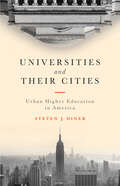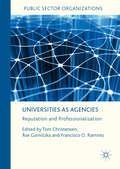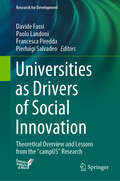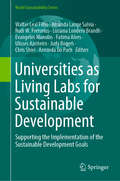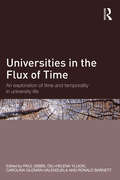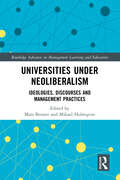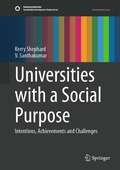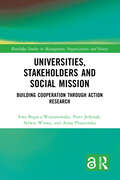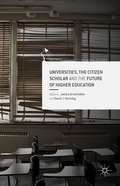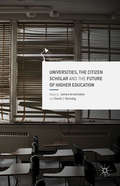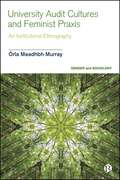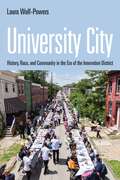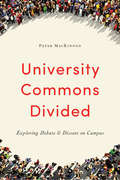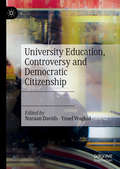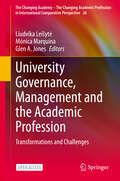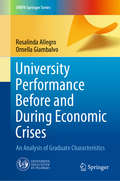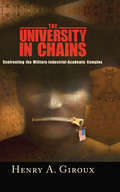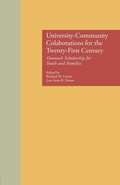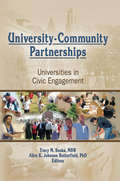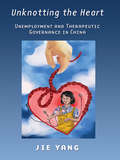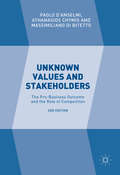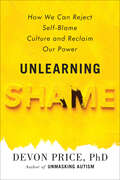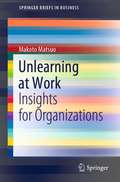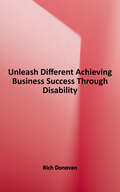- Table View
- List View
Universities and Their Cities: Urban Higher Education in America
by Steven J. DinerThe first broad survey of the history of urban higher education in America.Today, a majority of American college students attend school in cities. But throughout the nineteenth and much of the twentieth centuries, urban colleges and universities faced deep hostility from writers, intellectuals, government officials, and educators who were concerned about the impact of cities, immigrants, and commuter students on college education. In Universities and Their Cities, Steven J. Diner explores the roots of American colleges’ traditional rural bias. Why were so many people, including professors, uncomfortable with nonresident students? How were the missions and activities of urban universities influenced by their cities? And how, improbably, did much-maligned urban universities go on to profoundly shape contemporary higher education across the nation?Surveying American higher education from the early nineteenth century to the present, Diner examines the various ways in which universities responded to the challenges offered by cities. In the years before World War II, municipal institutions struggled to "build character" in working class and immigrant students. In the postwar era, universities in cities grappled with massive expansion in enrollment, issues of racial equity, the problems of "disadvantaged" students, and the role of higher education in addressing the "urban crisis." Over the course of the twentieth century, urban higher education institutions greatly increased the use of the city for teaching, scholarly research on urban issues, and inculcating civic responsibility in students. In the final decades of the century, and moving into the twenty-first century, university location in urban areas became increasingly popular with both city-dwelling students and prospective resident students, altering the long tradition of anti-urbanism in American higher education. Drawing on the archives and publications of higher education organizations and foundations, Universities and Their Cities argues that city universities brought about today’s commitment to universal college access by reaching out to marginalized populations. Diner shows how these institutions pioneered the development of professional schools and PhD programs. Finally, he considers how leaders of urban higher education continuously debated the definition and role of an urban university. Ultimately, this book is a considered and long overdue look at the symbiotic impact of these two great American institutions: the city and the university.
Universities as Agencies: Reputation and Professionalization (Public Sector Organizations)
by Tom Christensen Francisco O. Ramirez Åse GornitzkaThis book discusses how modern universities increasingly use reputation management in relation to internal and external challenges. Universities are increasingly characterized by social embeddedness, relating to many external stakeholders and international markets of students, researchers and research projects. This implies global pressure to standardize, formalize and rationalize their internal organization. The book uses data from China, Norway and US to show how reputation symbols are used and balanced, based on their web pages. Further, it uses extensive data from US universities to show how their internal organization structure is developing over time, related to three types of units/positions - development, diversity and legal offices and roles.
Universities as Drivers of Social Innovation: Theoretical Overview and Lessons from the "campUS" Research (Research for Development)
by Davide Fassi Paolo Landoni Francesca Piredda Pierluigi SalvadeoThis book reviews the social role of universities in their local urban contexts and describes a number of initiatives of major interest in terms of the impact achieved, the range of stakeholders involved, and the significance of the university campus and teachers as agents of change. It is divided into three parts, the first of which draws on the international literature to provide theoretical background regarding the role of universities and university campuses as drivers of and magnets for social innovation. The second and third parts each focus on four main themes of interest in the contemporary design setting: urban community gardens, social TV stations, mobile pavilions, and economic sustainability models. After a theoretical overview that also illustrates international best practices, it then focuses on the specific context of Milan, based on the pilot project recently conducted by the Politecnico di Milano, “CampUS - incubation and implementation of social practices”, which won the 25th ADI Compasso d’Oro Award (2018) in the social design category. The book is of interest to academics, students, those working at public institutions, and city policymakers.
Universities as Living Labs for Sustainable Development: Supporting the Implementation of the Sustainable Development Goals (World Sustainability Series)
by Walter Leal Filho Judy Rogers Chris Shiel Evangelos Manolas Ulisses Azeiteiro Amanda Lange Salvia Rudi W. Pretorius Luciana Londero Brandli Fatima Alves Arminda Do PacoThis book fills an important gap in the literature, and presents contributions from scientists and researchers working in the field of sustainable development who have engaged in dynamic approaches to implementing sustainability in higher education. It is widely known that universities are key players in terms of the implementation and further development of sustainability, with some having the potential of acting as “living labs” in this rapidly growing field. Yet there are virtually no publications that explore the living labs concept as it relates to sustainability, and in an integrated manner. The aims of this book, which is an outcome of the “4th World Symposium on Sustainable Development at Universities” (WSSD-U-2018), held in Malaysia in 2018, are as follows: i. to document the experiences of universities from all around the world in curriculum innovation, research, activities and practical projects as they relate to sustainable development at the university level; ii. to disseminate information, ideas and experiences acquired in the execution of projects, including successful initiatives and good practice; iii. to introduce and discuss methodological approaches and projects that seek to integrate the topic of sustainable development in the curricula of universities; and iv. to promote the scalability of existing and future models from universities as living labs for sustainable development. The papers are innovative, cross-cutting and many reflect practice-based experiences, some of which may be replicable elsewhere. Also, this book, prepared by the Inter-University Sustainable Development Research Programme (IUSDRP) and the World Sustainable Development Research and Transfer Centre (WSD-RTC), reinforces the role played by universities as living labs for sustainable development.
Universities in the Flux of Time: An exploration of time and temporality in university life
by Paul Gibbs Ronald Barnett Oili-Helena Ylijoki Carolina Guzmán-ValenzuelaHigher education and the institution of the university exist in time, their essential nature now continually subject to change: change in students, in knowledge, in structure and in their own communities and those they service. These changes are accompanied by a quickening of time, leading to a heightened intensity of academic life. Yet the nature of time in all the contemporary work on the university has been largely overlooked. This is an important omission and Universities in the Flux of Time has gathered leading academics whose contributions to the volume raise a debate as to the influence and use of time in the university. They do this in an exploration of how these changes are perceived in higher education and how these affect its temporality from local, national and global perspectives. By dealing with the time within the university, the book opens new spaces for the development of the university and civic society. The book develops an interdisciplinary understanding of the temporal issues of engaging with the past, present and future of higher education and its institutions, through consideration of the increased speed demanded for the production of able students and innovative research, to the accountability pressures from central governments and commerce. Reflecting on these issues in the higher education sector, Universities in the Flux of Time is split into three parts, with each one addressing time and its multiple relationships with the university: Past, present and future Knowledge and time Living with time This volume will provide essential reading for those on higher education studies courses as well as a wider audience of managers, practitioners, policy makers, academics and students and from many disciplinary perspectives including sociology, organisation studies, social psychology and the philosophy of education.
Universities under Neoliberalism: Ideologies, Discourses and Management Practices (Routledge Advances in Management Learning and Education)
by Mats Benner Mikael HolmqvistThe COVID-19 pandemic, the surge of populism, the climate crisis and many other destabilizing factors in our time, all point at the expectation of trustworthy knowledge and reliable organization devoted to knowledge production and dissemination. However, universities remain enmeshed in economic liberalization and ensuing cultural struggles where their funding, governance and practices reflect market imprints – even academic ideals such as originality, or social ideals such as relevance have been transformed into measurable units and thereby risk losing their historical sway. This predicament is the focus of this book. The book explores the rise of neo-liberalization in academic system in a highly unlikely place: Sweden, a country with a strong social democratic tradition and a long history of state regulation of higher education. As an advanced welfare state with a powerful labour movement and a large public sector, market ideals and practices have been carefully curtailed historically. This notwithstanding, a neoliberal university model has evolved there, reshaping notions of academic identities, institutional directions and notions of quality. This edited collection will be of value to researchers, academics and students with an interest in organizational studies, governance, management, higher education, sociology and politics.
Universities with a Social Purpose: Intentions, Achievements and Challenges (Sustainable Development Goals Series)
by V. Santhakumar Kerry ShephardThis book is a narrative of conversations between two professors, with different backgrounds, academic disciplines, life experiences, and from different continents. It shows how their discourse has brought them to a single destination defined by a mutual interest in the social purposes of universities, and a hope in common that their academic efforts will somehow do good in the world. The seventeen internationally-agreed Sustainable Development Goals (SDGs) provide focus for aspirations and plans regarding sustainability, but notably, the SDGs’ targets and indicators rarely provide detailed accounts of who is expected to enact change. This book addresses the role of higher education in this context and explores the social purposes of universities and their relation to the Sustainable Development Goals. It presents an academic analysis of this complex situation, based on insights from published literature on higher education, and the personal but very different experiences of two professors with this shared interest.
Universities, Stakeholders and Social Mission: Building Cooperation Through Action Research (Routledge Studies in Management, Organizations and Society)
by Piotr Jedynak Ewa Bogacz-Wojtanowska Sylwia Wrona Anna PluszyńskaToday's universities are confronted with questions about the increasing scale of corporatisation and commercialisation, as well as their decreasing activity in the field of the social mission, i.e., engagement in the real problems of ordinary people, local communities and society at large. As a remedy for this problem, this book proposes using action research as a means of shaping collaboration between universities and their stakeholders, taking into account related benefits, opportunities and challenges. In this context, we understand action research somewhat more broadly, as universities’ conducting useful research that becomes a domain of their social mission. The core message of this volume is the development of a cooperation process in which the university leaves its "ivory tower," builds relationships with its stakeholders and, as a result, engages more effectively in social life. In this book, readers will find an original perspective on action research, the application of which enables mutual benefits for universities and their stakeholders. It presents the authors’ original model of cooperation based on the AR approach and concrete examples of successful cooperation between universities and their stakeholders. Step by step, it illustrates how to initiate cooperation, conduct useful scientific research and together with stakeholders bring about changes in social life. This book will be of value to university managers, academics, students of social, management and economic sciences, as well as managers and specialists employed in organisations from various sectors that may be interested in cooperation with universities.
Universities, the Citizen Scholar and the Future of Higher Education (Palgrave Critical University Studies)
by David J. Hornsby James ArvanitakisThe future of higher education is in question as universities struggle to remain relevant to the present and future needs of society. The context in which learning occurs is rapidly changing and those engaged and interested in the place and position of university education need to figure out to adapt. This book embodies a vision for higher education where graduate attributes and proficiencies are at the core of the academic project, where degree programs move beyond disciplinary content and where students are encouraged to be Citizen Scholars. Through a series of cross-disciplinary and contextual cases, the contributors to this book articulate how this vision can be achieved in our pedagogical environments, future proofing higher education.
Universities, the Citizen Scholar and the Future of Higher Education (Palgrave Critical University Studies)
by David J. Hornsby James ArvanitakisThe future of higher education is in question as universities struggle to remain relevant to the present and future needs of society. The context in which learning occurs is rapidly changing and those engaged and interested in the place and position of university education need to figure out to adapt. This book embodies a vision for higher education where graduate attributes and proficiencies are at the core of the academic project, where degree programs move beyond disciplinary content and where students are encouraged to be Citizen Scholars. Through a series of cross-disciplinary and contextual cases, the contributors to this book articulate how this vision can be achieved in our pedagogical environments, future proofing higher education.
University Audit Cultures and Feminist Praxis: An Institutional Ethnography (Gender and Sociology)
by Órla Meadhbh MurrayBeing ‘REF-able’. The impact agenda. The student experience. University audit culture has infiltrated academic life, but how should we respond? Drawing on a five-year Institutional Ethnography of UK universities, the author provides a feminist take on the neoliberal university and abolitionist reflections on audit culture. For feminist and other critical academics, the interpretative power involved in audit processes provides an opportunity to collectively challenge and subvert, re-read and re-write institutions. This book challenges the myths and misinterpretations around how academic audit processes work, arguing that if we are complicit then we have agency to do them differently.
University City: History, Race, and Community in the Era of the Innovation District
by Laura Wolf-PowersIn twenty-first-century American cities, policy makers increasingly celebrate university-sponsored innovation districts as engines of inclusive growth. But the story is not so simple. In University City, Laura Wolf-Powers chronicles five decades of planning in and around the communities of West Philadelphia’s University City to illuminate how the dynamics of innovation district development in the present both depart from and connect to the politics of mid-twentieth-century urban renewal. Drawing on archival and ethnographic research, Wolf-Powers concludes that even as university and government leaders vow to develop without displacement, what existing residents value is imperiled when innovation-driven redevelopment remains accountable to the property market.The book first traces the municipal and institutional politics that empowered officials to demolish a predominantly Black neighborhood near the University of Pennsylvania and Drexel University in the late 1960s to make way for the University City Science Center and University City High School. It also provides new insight into organizations whose members experimented during that same period with alternative conceptions of economic advancement. The book then shifts to the present, documenting contemporary efforts to position university-adjacent neighborhoods as locations for prosperity built on scientific knowledge. Wolf-Powers examines the work of mobilized civic groups to push cultural preservation concerns into the public arena and to win policies to help economically insecure families keep a foothold in changing neighborhoods.Placing Philadelphia’s innovation districts in the context of similar development taking place around the United States, University City advocates a reorientation of redevelopment practice around the recognition that despite their negligible worth in real estate terms, the time, care, and energy people invest in their local environments—and in one another—are precious urban resources.
University Commons Divided: Exploring Debate and Dissent on Campus
by Peter MacKinnonIn recent years, a number of controversies have emerged from inside Canadian universities. While some of these controversies reflect debates occurring at a broader societal level, others are unique to the culture of universities and the way in which they are governed. In University Commons Divided, Peter MacKinnon provides close readings of a range of recent incidents with a view to exploring new challenges within universities and the extent to which the idea of the university as ‘commons,’ a site for open and contentious disagreement, may be under threat. Among the incidents addressed in this book are the Jennifer Berdahl case in which a UBC professor alleged a violation of her academic freedom when she was phoned by the university's board chair to discuss her blog on which she speculated about the reasons for the university president's departure from office; the case of Root Gorelick, a Carleton University biologist and member of the university’s board of governors who refused to sign a code of conduct preventing public discussion of internal board discussions; the Facebook scandal at Dalhousie University’s Faculty of Dentistry in which male students posted misogynistic comments about their female classmates. These and many other examples of turmoil in universities across the country are used to reach new insights on the state of freedom of expression and academic governance in the contemporary university. Accessibly written and perceptively argued, University Commons Divided is a timely and bold examination of the pressures seeking to transform the culture and governance of universities.
University Education, Controversy and Democratic Citizenship
by Nuraan Davids Yusef WaghidThis book explores the role of the university in upholding democratic values for societal change. The chapters advocate for the moral virtue of democratic patriotism: the editors and contributors argue that universities, as institutions of higher learning, can encourage the creation of critical and patriotic citizens. The book suggests that non-violence, tolerance, and peaceful co-existence ought to manifest through pedagogical university actions on the basis of educators’ desire to cultivate reflectiveness, criticality, and deliberative inquiry in and through their academic programmes. In a way, universities can respond more positively to the violence on our campuses and in society if public and controversial issues were to be addressed through an education for democratic citizenship and human rights.
University Governance, Management and the Academic Profession: Transformations and Challenges (The Changing Academy – The Changing Academic Profession in International Comparative Perspective #26)
by Glen A. Jones Liudvika Leišytė Mónica MarquinaThis volume investigates governance and management of higher education through the lens of the academic profession. Drawing on data from the Academic Profession in the Knowledge-based Society project, an international collaborative research study involving the administration of a common survey to faculty in more than twenty countries, this volume explores important issues of governance and management in relation to, and frequently from the perspective of, the academic profession. It analyzes the complex inter-relationships and intersections between decision processes and structures at both the system and institutional levels and the experiences and perceptions of the academics who play a central role in fulfilling the mission of higher education. Theoretical chapters review key concepts that have grounded the analysis of external (system-level) and internal (institution-level) governance, while the core chapters provide original empirical research, many involving comparative studies, exploring key challenges such as managerialism, gender, shifts in faculty perceptions of influence, and the importance of communication and institutional leadership. Chapter 4,10,11 and 12 of this book are available open access under a CC BY 4.0 license at link.springer.com.
University Performance Before and During Economic Crises: An Analysis of Graduate Characteristics (UNIPA Springer Series)
by Rosalinda Allegro Ornella GiambalvoThis book briefly analyzes the performance of selected Italian universities during a pre-crisis period and an economic crisis period, on the basis of graduate characteristics and graduate placement statistics. The Electre model is used to produce eighteen university rankings according to three different scenarios (Neutral, University, and Job), three different roles ascribed to the key criteria (overeducation and mismatching), and two years corresponding to two postgraduation placement sampling surveys carried out in a pre-crisis period (2006) and during a crisis period (2011). The eighteen rankings are based on Economics/Statistics and Political & Social Sciences graduates. The rankings vary according to both the scenarios considered and graduate characteristics. Some differences are noted between the two fields of study. The book will be of interest for statisticians interested in evaluation issues, policymakers concerned with university comparisons and rankings, and future students and graduates wishing to make the best choice when selecting their university course. In addition, the new methodology adopted will be relevant for scholars in Statistics and Engineering.
University in Chains: Confronting the Military-Industrial-Academic Complex
by Henry A. GirouxPresident Eisenhower originally included 'academic' in the draft of his landmark, oft-quoted speech on the military-industrial-complex. Giroux tells why Eisenhower saw the academy as part of the famous complex - and how his warning was vitally prescient for 21st-century America. Giroux details the sweeping post-9/11 assault being waged on the academy by militarization, corporatization, and right-wing fundamentalists who increasingly view critical thought itself as a threat to the dominant political order. Giroux argues that the university has become a handmaiden of the Pentagon and corporate interests, it has lost its claim to independence and critical learning and has compromised its role as a democratic public sphere. And yet, in spite of its present embattled status and the inroads made by corporate power, the defense industries, and the right wing extremists, Giroux defends the university as one of the few public spaces left capable of raising important questions and educating students to be critical and engaged agents. He concludes by making a strong case for reclaiming it as a democratic public sphere.
University-Community Collaborations for the Twenty-First Century: Outreach Scholarship for Youth and Families (MSU Series on Children, Youth and Families #Vol. 4)
by Richard M. Lerner Lou Anna K. SimonThis volume is a unique collection of original pieces chronicling diverse national examples of university-community partnerships.
University-Community Partnerships: Universities in Civic Engagement
by Tracy Soska Alice K ButterfieldExamine how your university can help solve the complex problems of your community Community Outreach Partnership Centers (COPC) sponsored by the United States Department of Housing and Urban Development (HUD) have identified civic engagement and community partnership as critical themes for higher education. This unique book addresses past, present, and future models of university-community partnerships, COPC programs, wide-ranging social work partnerships that involve teaching, research, and social change, and innovative methods in the processes of civic engagement. The text recognizes the many professions, schools, and higher education institutions that contribute to advancing civic engagement through university-community partnerships. One important contribution this book makes to the literature of civic engagement is that it is the first publication that significantly highlights partnership contributions from schools of social work, which are rediscovering their community roots through these initiatives.University-Community Partnerships: Universities in Civic Engagement documents how universities are involved in creative individual, faculty, and program partnerships that help link campus and community-partnerships that are vital for teaching, research, and practice. Academics and practitioners discuss outreach initiatives, methods of engagement (with an emphasis on community organization), service learning and other teaching/learning methods, research models, participatory research, and "high-engagement" techniques used in university-community partnerships. The book includes case studies, historical studies, policy analysis, program evaluation, and curriculum development. University-Community Partnerships: Universities in Civic Engagement examines: the increasing civic engagement of institutions of higher education civic engagement projects involving urban nonprofit community-based organizations and neighborhood associations the developmental stages of a COPC partnership problems faced in evaluating COPC programs civic engagement based on teaching and learning how pre-tenure faculty can meet research, teaching, and service requirements through university-community partnerships developing an MSW program structured around a single concentration of community partnership how class, race, and organizational differences are barriers to equality in the civic engagement process University-Community Partnerships: Universities in Civic Engagement is one of the few available academic resources to address the importance of social work involvement in COPC programs. Social work educators, students, and practitioners, community organizers, urban planners, and anyone working in community development will find it invaluable in proving guidance for community problem solving, and creating opportunities for faculty, students, and community residents to learn from one another.
Unknotting the Heart: Unemployment and Therapeutic Governance in China
by Jie YangSince the mid-1990s, as China has downsized and privatized its state-owned enterprises, severe unemployment has created a new class of urban poor and widespread social and psychological disorders. In Unknotting the Heart, Jie Yang examines this understudied group of workers and their experiences of being laid off, "counseled," and then reoriented to the market economy. Using fieldwork from reemployment programs, community psychosocial work, and psychotherapy training sessions in Beijing between 2002 and 2013, Yang highlights the role of psychology in state-led interventions to alleviate the effects of mass unemployment. She pays particular attention to those programs that train laid-off workers in basic psychology and then reemploy them as informal "counselors" in their capacity as housemaids and taxi drivers. These laid-off workers are filling a niche market created by both economic restructuring and the shortage of professional counselors in China, helping the government to defuse intensified class tension and present itself as a nurturing and kindly power. In reality, Yang argues, this process creates both new political complicity and new conflicts, often along gender lines. Women are forced to use the moral virtues and work ethics valued under the former socialist system, as well as their experiences of overcoming depression and suffering, as resources for their new psychological care work. Yang focuses on how the emotions, potentials, and "hearts" of these women have become sites of regulation, market expansion, and political imagination.
Unknown Values and Stakeholders: The Pro-Business Outcome and the Role of Competition
by Athanasios Chymis Paolo D'Anselmi Massimiliano Di BitettoThis second edition demonstrates that there are more conditions and actors prevalent in the economy than are considered today, and builds a balanced view of responsibility that would not be shunned by corporate executives. The wider economic responsibilities of organizations have been identified for corporations, and responsibility has been focused on business. Unknown Values and Stakeholders argues that all organizations, including public administration, should be accountable for their economic responsibilities. The authors reveal the unknown values and stakeholders of the accountability game and the new inequality in working conditions of the employed while, at the same time, showing a path towards effective economic development.
Unlearning Shame: How We Can Reject Self-Blame Culture and Reclaim Our Power
by Devon PriceLearn to identify—and combat—Systemic Shame, the feeling of self-hatred and disempowerment that comes from living in a society that blames individuals for systemic problems, with this invaluable resource from the social psychologist and author of Unmasking Autism.&“Stop doomscrolling and read this book. You&’ll feel better, I promise.&”—Celeste Headlee, journalist and bestselling authorSystemic Shame is the socially engineered self-loathing that says we are solely to blame for our circumstances. It tells us that poverty is remedied by hard-working people pulling themselves up by their bootstraps, that marginalized people are personally responsible for solving the problem of their own oppression, and that massive global crises like climate change can be solved with individual action. Feeling overwhelmed? That&’s your problem, too. The more we try and ultimately fail to live up to impossible societal standards of moral goodness, the more shame we feel—and the more we retreat into isolation and despair.Social psychologist Dr. Devon Price knows firsthand the destructive effects of Systemic Shame; he experienced shame and self-hatred as he grappled with his transgender identity, feeling as if his suffering was caused by his own actions rather than systems like cissexism. And it doesn&’t just end with internal feelings of anguish. It causes us to judge other people the same way we fear being judged, which blocks us from seeking out the acceptance and support we need and discourages us from trying to improve our communities and our relationships.In Unlearning Shame, Dr. Price explores how we can deal with those hard emotions more effectively, tackling the societal shame we&’ve absorbed and directed at ourselves. He introduces the antidote to Systemic Shame: expansive recognition, an awareness of one&’s position in the larger social world and the knowledge that our battles are only won when they are shared. He provides a suite of exercises and resources designed to combat Systemic Shame on a personal, interpersonal, and global level through rebuilding trust in yourself, in others, and in our shared future.By offering a roadmap to healing and a toolkit of actionable items, Unlearning Shame helps us reject hopelessness and achieve sustainable change and personal growth.
Unlearning at Work: Insights for Organizations (SpringerBriefs in Business)
by Makoto MatsuoThis book is to provide insights into the process of individual unlearning, which is little known in previous studies. This is the first book that described how employees should unlearn, i.e., abandon obsolete and outdated beliefs or routines to acquire new ones, at workplace. Updating old knowledge and skills to new one is crucial not only for organizations but also for individuals to survive in today’s competitive and turbulent environment. It provides readers with mechanisms by which personal factors, such as goal orientation, reflection, and critical reflection, and promotes employees’ unlearning under the influence of situational factors such as supervisors’ behaviors and promotion of the positions. Based on the findings by quantitative and qualitative analyses using questionnaire survey and interviews, this book is highly recommended to readers who are interested in higher-order learning process for self-change at work in the fields of organizational behavior and human resources development.
Unlearning the City: Infrastructure in a New Optical Field
by Swati ChattopadhyayCities are more than concrete and steel infrastructure. But modern urban theory does not have the language to describe and debate the vital component of urban life that is lived on the streets of cities and towns. Swati Chattopadhyay has written a nuanced argument for a new vocabulary of the city in Unlearning the City, proposing a way of analyzing the materiality of the urban that captures the ever-changing element of human experience.Urban life is intrinsically messy and usually refuses to conform to the rigid views laid down in much of urban studies theory. Chattopadhyay looks at urban life in India with a fresh perspective that incorporates the everyday and the unstructured. As the first to apply the theories of subalternity for an understanding of urban history, Chattopadhyay provides an in-depth study of vehicular art, street cricket, political wall writing, and religious festivities that link the visual and spatial attributes of these popular cultural forms with the imagination and practices of urban life. She contends that these practices have a direct impact on the configuration and knowledge of public space, and the political potential of the people inhabiting cities.Unlearning the City uses the popular culture of Indian cities to question the dominant conception of urban infrastructure and encourage a conceptual realignment in how the city is seen, discussed, and even experienced.
Unleash Different: Achieving Success Through Disability
by Rich DonovanThere are 1.3 billion people around the world who identify as having a disability. When you include friends and family, the disability market touches 53% of all consumers. It is the world's largest emerging market. Unleash Different illustrates how companies like Google, PepsiCo, and Nordstrom are attracting people with disabilities as customers and as employees. Replacing 'nice to do' with 'return on investment' allows market forces to take over and the world's leading brands to do what they do best: serve a market segment - in this case, the disability market.
